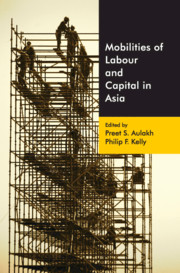Book contents
- Frontmatter
- Contents
- List of Figures
- List of Tables
- List of Appendices
- Acknowledgements
- 1 Introduction: Conceptualizing Labour and Capital Mobilities In and Out of Asia
- SECTION I From Capital to Labour Mobility
- SECTION II From Labour to Capital Mobility
- 7 Skills Development Initiatives and Labour Migration in a Secondary Circuit of Globalized Production: Evidence from the Garment Industry in India
- 8 The Counter Geographies of Globalization: Women's Labour Migration along the Nepal–Persian Gulf Migratory Corridor
- 9 Migration and Developmental Capital in a Punjab Village
- 10 The Production of Nurses for Global Markets: Tracing Capital and Labour Circulation In and Out of Asia
- 11 The Mobility–Oligopoly Nexus in Philippine Property Development
- Notes on Contributors
- Index
10 - The Production of Nurses for Global Markets: Tracing Capital and Labour Circulation In and Out of Asia
from SECTION II - From Labour to Capital Mobility
Published online by Cambridge University Press: 24 December 2019
- Frontmatter
- Contents
- List of Figures
- List of Tables
- List of Appendices
- Acknowledgements
- 1 Introduction: Conceptualizing Labour and Capital Mobilities In and Out of Asia
- SECTION I From Capital to Labour Mobility
- SECTION II From Labour to Capital Mobility
- 7 Skills Development Initiatives and Labour Migration in a Secondary Circuit of Globalized Production: Evidence from the Garment Industry in India
- 8 The Counter Geographies of Globalization: Women's Labour Migration along the Nepal–Persian Gulf Migratory Corridor
- 9 Migration and Developmental Capital in a Punjab Village
- 10 The Production of Nurses for Global Markets: Tracing Capital and Labour Circulation In and Out of Asia
- 11 The Mobility–Oligopoly Nexus in Philippine Property Development
- Notes on Contributors
- Index
Summary
Introduction
How do capital and labour mobilities interact in the context of Indian nurse training and migration, and what kind of institutional actors facilitate the multiscalar mobility of this labour? This chapter will address this question using the example of the global mobility of nurses. Nurses represent the largest, most internationalized and feminized section of the health profession, and developed regions of world have demanded well-trained nurses because of demographic and health care delivery changes. These changes are connecting regions of the world through increasingly globally oriented models of nursing training, skills development, and labour and related capital mobility. The nature of historic and new migration corridors marks the evolving spatiality of this labour mobility and associated capital flows. Novel state–market interactions structure these processes of labour mobility and mark new institutional forms of governance related to nurse training and deployment of migrant labour. Nursing is a specifically gendered occupation, and the cultural context allows us to understand the particular embodied nature of nursing—how this contributes to the disciplining and controlling of workers, and how their skills and capabilities are constructed and utilized. This chapter makes explicit connection between labour and capital mobility by drawing upon research conducted in India and Canada to highlight how labour and capital mobilities interact in global nursing labour circulation.
The health care services industry is one of the most significant and growing parts of the global economy. The United Nations’ International Standard Industrial Classification (ISIC) categorizes the health care industry as hospital activities, medical and dental practice activities, and other human health activities that occur under the supervision of health professionals in various areas. In terms of value, a 2017 health care outlook report by Deloitte (2017) indicated that health care spending represents 10.4 per cent of global GDP in 2015 (US$7 trillion in 2015) and is expected to rise over the next 5 years, especially in low-income nations. Health care is witnessing neoliberal industrialization in terms of the division, standardization, deskilling of health care labour, and rise of managerial superstructures (Rastegar, 2004), including widespread but differentiated engagement with New Public Management approaches to increase efficiency and enhance innovation (Pollitt and Bouckaert, 2017).
- Type
- Chapter
- Information
- Mobilities of Labour and Capital in Asia , pp. 211 - 232Publisher: Cambridge University PressPrint publication year: 2020
- 1
- Cited by



